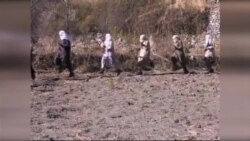Foreign fighters are flooding into Syria and Iraq in record numbers. Up to 15,000 foreign fighters from at least 81 nations are believed to be engaged in the war in those two countries.
Some analysts say it is the largest recruitment of foreign fighters since the Afghan jihad against occupying Soviet troops in the 1980's.
As in Afghanistan, most of the foreigners fighting in Syria and Iraq come from the Arab world. But this time several thousand of them carry Western passports, including from the European Union, the United States, Canada, Australia and New Zealand.
At least 1,000 have arrived from Russia as well, according to intelligence experts. And as the fighting continues, the numbers of foreign fighters are growing.
Most of the militants are fighting alongside the group calling itself Islamic State, also known as ISIS or ISIL. It is the largest, most zealous and dangerous group in a battleground riddled with jihadists.
A New York-based intelligence firm, the Soufan Group, says the region has been transformed into an “incubator for a new generation of terrorists” thriving close to Western borders.
A lot of them are young and many of those arriving from the West are converts to Islam, says Patrick Skinner, the Soufan Group’s security expert, speaking via Skype.
“They appeal to target audiences - between 15 to 25-year-olds, primarily male but not always - with a sense of fun. In the West, they are making ‘jihad’ seem like a video game. They don’t show the true horrors of war. They just show Hollywood explosions and the fun. And teenagers by definition are looking for excitement," said Skinner.
“They are disaffected, they feel no connection with society, with family. So ISIS fills that void perfectly.”
Some have a sense of Muslim persecution.
“They want to go help fight for Sunnis, in this case Muslims who are being oppressed by the Assad regime and now the West," said Skinner.
Others are zealots attracted to violence, says terrorism expert Brian Jenkins.
“The fact that they broadcast that [violence] suggests that they think this will not only terrify their opponents, but will appeal to a certain group of people who want to come and participate in that," said Jenkins.
Jenkins also emphasizes the international concern over what these young men - and some women - might do once they leave the battlefield after being exposed to the radicalizing influences of jihadi extremism.
Western nations, particularly in Europe, are wary that returning jihadists could carry out terrorist acts on their soil, says Jorge Benitez, a security and NATO expert at the Atlantic Council.
"The barbarity of the things they are learning - from beheadings to crucifixion - they are very concerned that these types of individuals will return to Europe, because they still have EU passports, and will start feeding this type of malignant fanaticism and violence in Europe," said Benitez.
The issue of terrorists recruiting foreigners to fight in the Middle East has prompted U.S. President Barack Obama to preside over an unusual meeting of the U.N. Security Council to discuss how to halt this mounting global threat.





